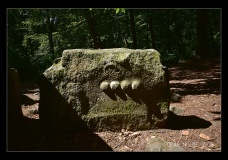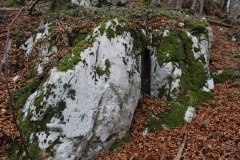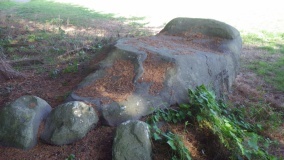Andy Burnham's Blog, page 3
November 16, 2025
La Maison des Feins
A lovely little allée couverte deep inside an atmospheric oak forest just to the east of the village of Tressé. Truly a house for the fairies. All but the end capstone are still in place, and at the back end there is a nice little additional cell. Within this back cell are some exceptional carvings on the southern side stone, of two pairs of breasts with their collars, on a rectangular cartouche giving them a big relief. There are also the remains of two pairs on the chevet stone, but these have been crudely hacked off in the past, leaving just the outlines.
Published on November 16, 2025 13:13
Tschütschiwald Chindlistein
More fertility tales - it was once said that babies came from the cleft of this stone - at least that's what they told the children! Close to the Tschütschiwald Chapel in the hills of Tschütschi Forest, Switzerland. The chapel must have existed as early as the beginning of the 13th century.
Published on November 16, 2025 12:57
Menhir Lit de Margot
Margot is back (a type of Beton fairy) - this looks like a natural rock of dolerite (4.20 x 2.0 x 1.0 m) but has the characteristics of a fallen standing stone.
Published on November 16, 2025 06:58
November 14, 2025
Menhir dit la Chaise-à-Margot
The name means Margot's Chair - referring to fairies in Breton folklore. A smallish menhir which does indeed look like a seat. Part of the megalithic complex "La Lande du Gras" with 2 menhirs and 3 long barrows - see the nearby sites list on our page for more.
Published on November 14, 2025 10:04
November 13, 2025
Chanctonbury Ring
See how the LiDAR whizzes through all the trees so we can see what's underneath. Photos of Chanctonbury Ring including some from Miles Russell's excavation of 1990 are our page. First inhabited in the Bronze Age, the defensive works are from the Iron Age, whilst the Romans built a temple in the middle and the Saxons used it as a fort. Throughout the ages it has been used as a beacon and had become a tourist attraction by the early 19th century. The ring has also been associated with hauntings, fairies and UFOs. The trees were planted in the earthworks by the Goring family from Wiston House below in around 1760 though most of those were lost in the hurricane of 1987. However, a descendent of Charles Goring replanted the crown with beech trees soon after.
Published on November 13, 2025 07:27
November 11, 2025
The Castles (County Durham)
Pretty much all the vintage Time Team episodes can now be watched on YouTube, along with their new productions of course. Here's a good, if inconclusive one from 2008 featuring this enigmatic site in Co. Durham, linked below. The Castles, near Hamsterley, County Durham, is an archaeological conundrum. A massive rectangular dry-stone enclosure, some 75 metres by 90 metres, it has been described variously as an Iron-Age fort, a Roman penal colony, a native sub-Roman or Anglo-Saxon encampment, and a Romano-British farmstead.
Published on November 11, 2025 13:19
Gallow Howe (Castleton)
Located to the immediate east of the Castleton / Hutton Le Hole road as it climbs out of Castleton and levels off on Castleton Rigg is the site of what antiquarian John Christopher Atkinson described as a howe (barrow) with a walled chamber (cist / chambered cairn?) when he opened it in 1863.
Published on November 11, 2025 08:51
Dolmen im Randowtal
The remains of a destroyed dolmen about 100km NE of Berlin in Mecklenburg-Western Pomerania. It was likely part of a larger burial ground in the Randow Valley. About ten years ago, several stone cists and another dolmen were excavated on the opposite side of the Randow River, containing human bones from multiple burials.
Published on November 11, 2025 08:43
November 8, 2025
Pierre de Fécondité (Camlez)
A 1.5m tall stele near Chapelle Saint Nicolas, Bretagne. Traditionally women would rub their belly against the stone in the hope of becoming pregnant, and it could reputedly cure young children with disabilities.
Published on November 08, 2025 13:43
November 7, 2025
Stockland Great Castle
Hillfort vs Agriculture, you can see who won.... An Iron Age hillfort in Devon which originally had 3 rings of ditches and ramparts. Its earthworks enclose an area of 4 ha.
Published on November 07, 2025 04:12













